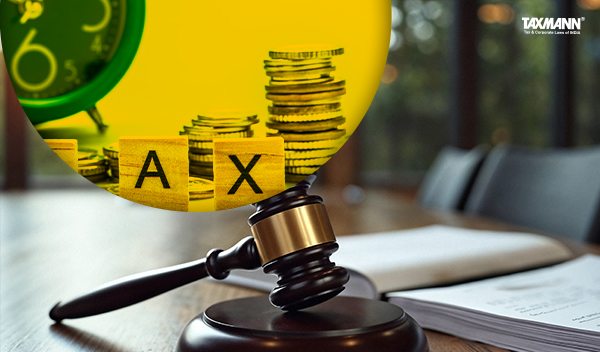Amendment by FA 2024 Regarding Credit of TCS to Be Given to Person Other Than Collectee is Retrospective in Nature | ITAT
- Blog|News|Income Tax|
- 3 Min Read
- By Taxmann
- |
- Last Updated on 21 February, 2025

Case Details: Anshul Anil Goel vs. DCIT (1) 1 - [2025] 171 taxmann.com 382 (Pune-Trib.)
Judiciary and Counsel Details
- R.K. Panda, Vice President & Ms Astha Chandra, Judicial Member
-
Sharad A. Shah for the Appellant.
-
Ramnath P. Murkunde for the Respondent.
Facts of the Case
Assessee, an individual, filed his return of income declaring total income, including the income of his minor child, which had been clubbed as per the provisions of section 64(1A). The assessee claimed TDS and TCS, and the said TCS constituted an amount of TCS collected in the hands of his minor child.
Since the income of the minor child was required to be clubbed in the hands of the assessee, the assessee claimed the TCS collected in the name of the minor child. However, the Centralized Processing Center (CPC) denied the claim of TCS collected in the hands of the minor child and raised a demand for the corresponding amount.
Assessee filed an appeal before the CIT(A), wherein CIT(A) dismissed the appeal. Aggrieved by the order, an appeal was filed to the Pune Tribunal.
ITAT Held
The Tribunal held that it was an admitted fact that the assessee filed his return of income declaring total income, including the income of his minor child, which had been clubbed as per the provisions of section 64(1A). Since the income of the minor child was required to be clubbed in the hands of the assessee, the assessee claimed the TCS collected in the name of the minor child.
The CIT(A) dismissed the claim on the ground that the Memorandum explaining the provisions in the Finance Bill, 2024, was applicable from 1-1-2025. Since no other mechanism had been provided to allow such TCS credit in the Act till the said amendment, which took effect only from 1-1-2025, the claim of the assessee could not be entertained.
It was held that the assessee cannot be denied his rightful claim of TDS/TCS if the corresponding income has already been offered to tax. Therefore, the amendment introduced by the Finance Act 2024 should be considered retrospective and should not operate to the assessee’s disadvantage in asserting a legitimate claim.
Since the income of the minor child was clubbed with the income of the assessee, the corresponding TCS collected in the hands of the minor also should be allowed, and due credit should be given to the assessee. The revenue cannot be allowed to retain the tax collected at the source without credit being available to anybody. Accordingly, if the credit of tax is not allowed to the assessee, credit of TCS cannot be taken by anybody.
List of Cases Reviewed
- Allied Motors (P) Ltd. v. CIT (1997) 224 ITR 677 (SC)
- Genpact India Pvt. Ltd. v. DCIT (2019) 265 DLT 123 [Para 18] – followed.
List of Cases Referred to
- Aluminium Corporation of India Ltd. v. Union of India & Ors. 1975 AIR 2279 (para 11)
- Pinnacle Vastunirman Pvt. Ltd. v. Union of India (2021) 438 ITR 27 (Bom) (para 11)
- Allied Motors (P.) Ltd. v. CIT [1997] 91 Taxman 205/224 ITR 677 (SC) (para 12)
- Wipro Limited v. JCIT & Anr. (2021) 205 DTR 434 (Kar) (para 12)
- Union of India v. Tata Chemicals Ltd. [2014] 43 taxmann.com 240/222 Taxman 225/363 ITR 658 (SC) (para 12).
Disclaimer: The content/information published on the website is only for general information of the user and shall not be construed as legal advice. While the Taxmann has exercised reasonable efforts to ensure the veracity of information/content published, Taxmann shall be under no liability in any manner whatsoever for incorrect information, if any.

Taxmann Publications has a dedicated in-house Research & Editorial Team. This team consists of a team of Chartered Accountants, Company Secretaries, and Lawyers. This team works under the guidance and supervision of editor-in-chief Mr Rakesh Bhargava.
The Research and Editorial Team is responsible for developing reliable and accurate content for the readers. The team follows the six-sigma approach to achieve the benchmark of zero error in its publications and research platforms. The team ensures that the following publication guidelines are thoroughly followed while developing the content:
- The statutory material is obtained only from the authorized and reliable sources
- All the latest developments in the judicial and legislative fields are covered
- Prepare the analytical write-ups on current, controversial, and important issues to help the readers to understand the concept and its implications
- Every content published by Taxmann is complete, accurate and lucid
- All evidence-based statements are supported with proper reference to Section, Circular No., Notification No. or citations
- The golden rules of grammar, style and consistency are thoroughly followed
- Font and size that’s easy to read and remain consistent across all imprint and digital publications are applied



 CA | CS | CMA
CA | CS | CMA
